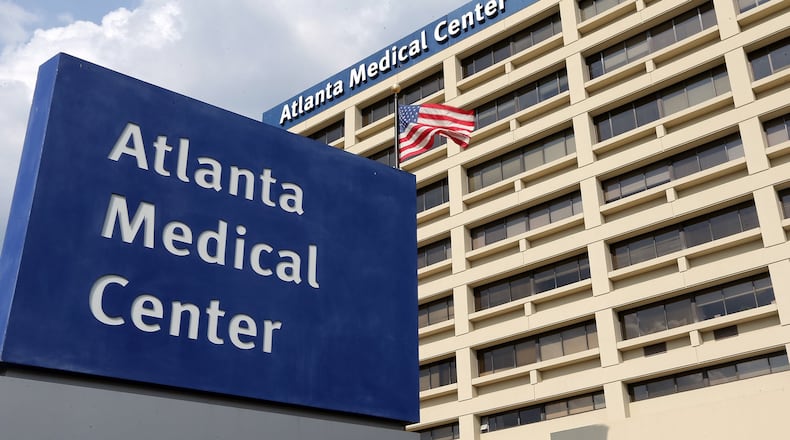As a $400 million fraud and kickbacks case against former Tenet Healthcare executives nears trial in Atlanta, the guilty plea of an alleged co-conspirator could derail a federal judge’s finding that scant evidence exists to support the government’s theory of an unlawful conspiracy.
A federal appellate judge signaled during a hearing on Tuesday that it was “shocking” for an Atlanta trial judge to accept in 2014 the guilty plea of alleged co-conspirator Tracey Cota, only to determine in November 2022 that prosecutors hadn’t provided enough evidence of a conspiracy to admit Cota’s testimony and that of nine other alleged co-conspirators at a trial against Cota’s ex-husband and two former Tenet executives.
“It just seems so strange to say, ‘I’m going to let you plead guilty to a conspiracy,’ and then say, ‘A conspiracy doesn’t exist,’” Judge Andrew L. Brasher of the U.S. Court of Appeals for the Eleventh Circuit said. “It’s shocking to me.”
Federal prosecutors in the long-running criminal case against former Tenet Healthcare executives John Holland and William Moore as well as Edmundo Cota, the former head of a company that operated medical clinics for predominantly undocumented Hispanic women, want to use co-conspirator testimony at trial.
The government contends the co-conspirator testimony is a key factor in proving that Holland, Moore and Edmundo Cota orchestrated a multimillion-dollar kickbacks scheme to have patients of Clinica de la Mama, run by the Cotas, referred to Tenet hospitals led by Holland and Moore in Georgia and South Carolina.
The plot allegedly resulted in the fraudulent billing of federal health care programs for at least $400 million and the fraudulent receipt of at least $127 million on claims. Tenet, through Holland and Moore, allegedly paid more than $12 million in bribes to Clinica de la Mama to ensure patients gave birth at Tenet hospitals.
Holland, Moore and Edmundo Cota claim the Tenet payments to Clinica de la Mama were for legitimate services, including the management of a physician residency clinic, translators, the handling of Medicaid eligibility paperwork, community outreach, and marketing.
U.S. District Judge Amy Totenberg accepted Tracey Cota’s plea of guilty to a single count of conspiracy to pay and receive remuneration in exchange for Medicaid patient referrals, before Holland, Moore and Edmundo Cota were indicted in 2017. But eight years after Tracey Cota’s guilty plea, Judge Totenberg denied the federal government’s request to admit the testimony of Tracey Cota and other alleged co-conspirators at trial against Holland, Moore and Edmundo Cota, stating that prosecutors had presented “scant” evidence of willful misconduct.
In Tuesday’s hearing before an Eleventh Circuit panel, U.S. Department of Justice attorney John-Alex Romano said on behalf of the federal government that it had submitted enough evidence in the case to allow the co-conspirator testimony at trial. He said Tracey Cota’s guilty plea and statements to law enforcement were corroborated by documentary evidence that a criminal conspiracy underpinned the agreements between Tenet and Clinica de la Mama.
Romano cited several communications among Tenet and Clinica de la Mama staff, including a 2009 email from a Tenet hospital executive complaining about being “held hostage” by the Cotas’ company.
“That’s pretty explicit in explaining why the hospitals are entering into these agreements with Clinica,” he said. “These contracts were not above board. Tracey Cota explained that they were pretext for paying Clinica to refer patients to the hospitals.”
Judge Charles R. Wilson pointed out that Holland, Moore and Edmundo Cota claimed they had relied in good faith on the advice of attorneys who vetted the contracts at issue.
Brian F. McEvoy, an attorney for Moore, said the contracts were “reviewed inside and outside by Clinica lawyers, by Tenet lawyers, and by outside lawyers.”
“Everyone agrees we entered into these contracts,” McEvoy said during the hearing. “The question is, was a crime committed? We say no.’”
Romano told the appellate judges that the lawyers who purportedly approved the agreements between Tenet and Clinica de la Mama were not fully aware of the kickbacks scheme. He said Tracey Cota was clear in her statements to law enforcement that “the contracts do not tell the whole story.”
Judge Brasher indicated that the ruling by Judge Totenberg essentially forced the government to prove its case before trial.
“My concern is that we’re sort of having a trial on the papers before an actual trial,” he said. “It just seems like such a strange proceeding.”
Amy Levin Weil, an attorney for Holland, said prosecutors had to show criminal intent in order to be allowed to submit at trial the testimony of alleged co-conspirators. She said the definition of conspiracy points to “some unlawful or criminal act.”
Weil said that nothing Tracey Cota says could prove Holland’s guilt. She said the patient referral arrangement between Tenet and Clinica de la Mama involved legitimate and valuable services.
“There’s no smoke and mirrors here,” she said. “Everybody knew what was going on.”
Tenet, based in Texas, has been under investigation for almost 20 years. In 2006, it entered into a civil settlement with the federal government to resolve allegations of fraudulent billing and Anti-Kickback Statute violations. And in 2016 Tenet and two subsidiaries – Atlanta Medical Center Inc. and North Fulton Medical Center Inc. — agreed to pay $513 million to resolve criminal charges and a civil case that accused the hospitals of paying kickbacks to get patient referrals.
About the Author
The Latest
Featured


